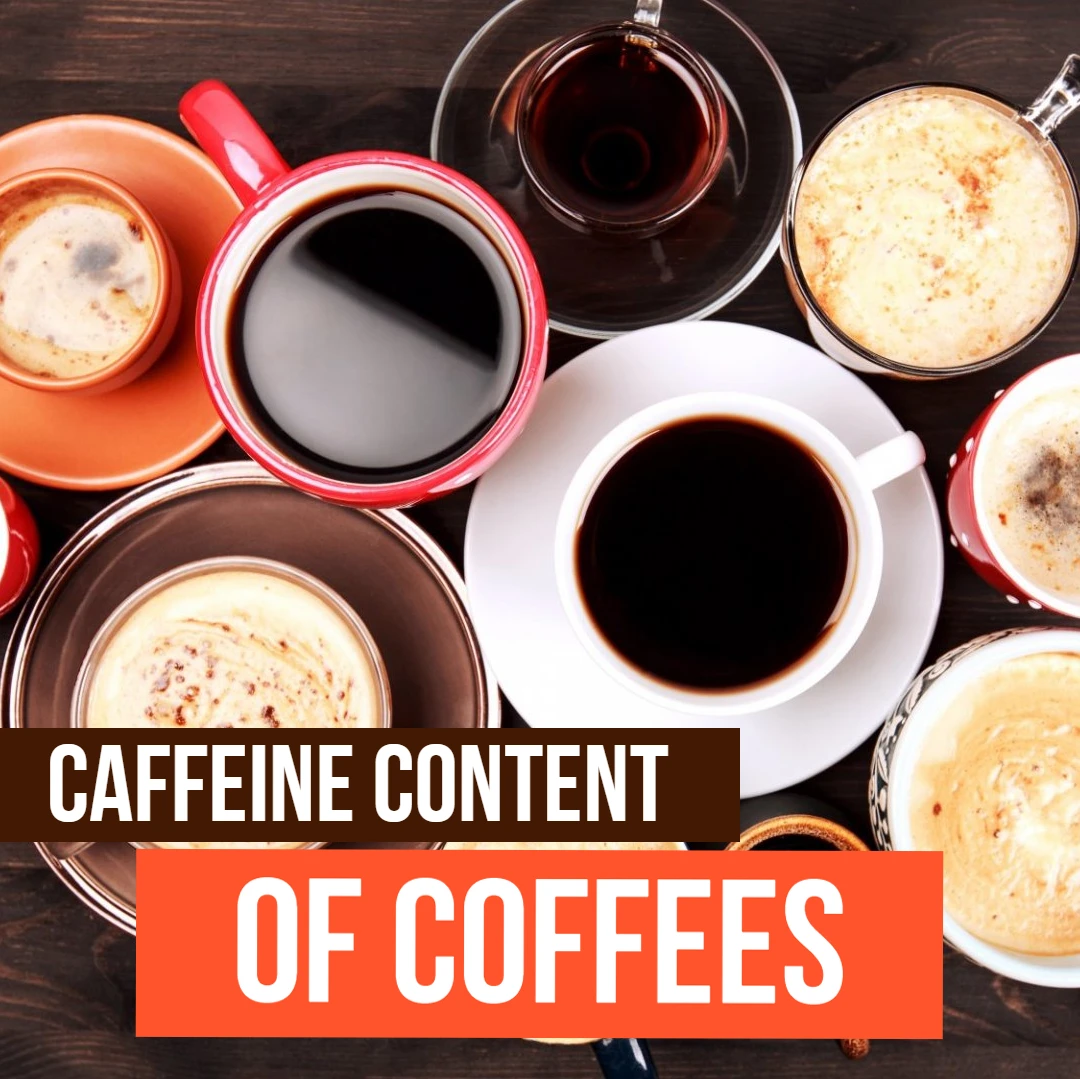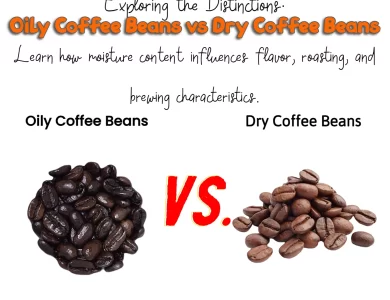Caffeine in Coffees

Caffeine is a naturally occurring stimulant found in coffee beans, as well as in other foods and beverages such as tea, chocolate, and some soft drinks. It is a central nervous system stimulant, which means it can stimulate the brain and nervous system, leading to increased alertness and energy. In addition to its stimulating effects, caffeine can also improve mood, reduce fatigue, and enhance cognitive function.
The amount of caffeine in a cup of coffee can vary depending on various factors such as the type of coffee bean, the brewing method, and the serving size.
On average, a cup (8 oz) of brewed coffee contains about 95 milligrams of caffeine. However, the caffeine content can vary depending on the type of bean and the roast. For example, light roast coffee tends to have less caffeine than dark roast coffee because the roasting process can reduce the amount of caffeine in the bean.
What Factors Affect the Caffeine Content of Coffee?
There are several factors that can affect the caffeine content of coffee:
- Type of coffee bean: Different types of coffee beans, such as Robusta and Arabica, can have different caffeine levels. Robusta beans typically have higher caffeine content than Arabica beans.
- Roast level: The darker the roast, the less caffeine content in the coffee beans.
- Brewing method: Different brewing methods, such as drip, French press, and pour-over, can affect the caffeine content. A stronger brew will have more caffeine than a weaker brew, even if the same type and amount of beans are used.
- Serving size: The larger the serving size, the more caffeine in the coffee. for example, Starbucks’ cup sizes have different caffeine levels.
- Bean’s origin: Different regions where the beans are grown can have varying caffeine levels.
- Additional Caffeine: Some brands might have higher caffeine levels by adding caffeine to the coffee beans during the roasting process.
It’s important to note that the actual caffeine content of a particular cup of coffee may vary depending on these factors. It’s always good to check the caffeine content in the below table if you are looking for a specific amount of caffeine in your cup.
How Much Caffeine Is in a Cup of Regular Coffee?
The amount of caffeine in coffee can vary greatly depending on a variety of factors, including the type of coffee bean, the brewing method, and the serving size. For example, an 8 oz cup of Regular Coffee can contain anywhere from 30 to 200 milligrams of caffeine. Additionally, there’s no brand name or coffee type you provided in the table that I’m familiar with, so it’s hard to verify its authenticity. A general rule of thumb is that a typical 8 oz cup of coffee contains around 95 milligrams of caffeine, with robusta having slightly more than arabica.
Here is a list of some common types of coffee and their approximate caffeine content per 8 oz serving (a cup of coffee):
- Robusta: 40-75 mg
- Arabica: 60-90 mg
- Espresso: 63-126 mg
- Drip coffee: 80-135 mg
- French press: 80-135 mg
- Pour over: 80-135 mg
- Instant coffee: 30-90 mg
It’s worth noting that the actual caffeine content of a particular cup of coffee may vary depending on factors such as the specific beans used, the roast level, and the brewing method. Additionally, the serving size can also affect the caffeine content.
Robusta coffee beans contain more caffeine than Arabica coffee beans. Robusta beans are generally considered to be hardier and more disease-resistant than Arabica beans, and they are also less expensive to produce. As a result, they are often used in instant coffee and other lower-quality blends.
Arabica beans, on the other hand, are considered to be of a higher quality than Robusta beans, and they are generally more expensive. They are often used in specialty coffee blends.
Espresso is a concentrated coffee made by forcing pressurized hot water through finely-ground coffee beans. Because of the pressure and the small serving size, a single shot of espresso contains more caffeine than a regular cup of coffee.
Drip coffee, French press, and pour-over are different brewing methods for coffee. Drip coffee is made by pouring hot water over coffee grounds in a paper or metal filter. French press is made by steeping coarsely ground coffee beans in hot water before pressing a plunger to separate the liquid from the solids. Pour over is made by pouring hot water over coffee grounds in a filter, similar to drip coffee. The caffeine content of these brewing methods is similar, but depending on the number of coffee beans and the brewing time, the caffeine amount could vary.
Instant coffee is made by dehydrating brewed coffee and then turning it into a powder. The caffeine content of instant coffee is generally lower than that of regular coffee, but it can vary depending on the brand and the preparation method.
It’s also worth noting that some brands might have higher caffeine levels by adding caffeine to the coffee beans during the roasting process. It’s always good to check the label or ask the manufacturer for the caffeine content.
The caffeine content of K-Cup coffee
The caffeine content of K-Cup coffee can vary depending on the brand and the specific flavor. Some brands use more robusta beans which have higher caffeine content than Arabica beans while others may add caffeine to the coffee pods during the roasting process.
Here is some approximate caffeine content for different K-Cup coffee brands and flavors:
- Green Mountain Coffee Breakfast Blend K-Cup: 60-80 mg per 8 oz cup
- Starbucks Pike Place Roast K-Cup: 90-95 mg per 8 oz cup
- Dunkin’ Donuts Original Blend K-Cup: 96-100 mg per 8 oz cup
- Death Wish Coffee K-Cup: 200 mg per 8 oz cup
- Folgers Classic Roast K-Cup: 100-150 mg per 8 oz cup
It’s always good to check the label or ask the manufacturer for the caffeine content of a specific K-Cup coffee, as the caffeine content can vary depending on the brand and flavor. Additionally, the amount of coffee in the pod and the brewing time can also affect the caffeine content.
Caffeine Content in Commercial Coffee Chains
The caffeine content in coffee from commercial chains can vary widely depending on the type of coffee, the roast, and the size of the cup. Here is a general guide to the caffeine content in some popular coffee drinks from major commercial chains:
- Starbucks: A tall (12 oz) brewed coffee contains about 235 mg of caffeine, a Starbucks grande coffee (16 oz) contains about 310 mg, and a venti (20 oz) contains about 410 mg.
- Dunkin’ Donuts: A small (10 oz) cup of coffee contains about 150 mg of caffeine, a Dunkin’ Donuts medium cup of coffee (14 oz) contains about 210 mg, and a large (20 oz) contains about 300 mg.
- McDonald’s: A small (12 oz) cup of coffee contains about 109 mg of caffeine, a medium cup of McDonald’s coffee (16 oz) contains about 145 mg, and a large (21 oz) contains about 185 mg.
It’s important to note that these are just rough estimates and the actual caffeine content of a cup of coffee may vary depending on the specific location, brewing method, and beans used.
Caffeine Content in Different Cup Sizes
The amount of caffeine in a cup of coffee can also vary depending on the size of the cup. Here is a general guide to the caffeine content in different cup sizes:
- 8 oz cup: About 95-200 mg of caffeine
- 12 oz cup: About 145-265 mg of caffeine
- 16 oz cup: About 190-310 mg of caffeine
- 20 oz cup: About 280-420 mg of caffeine
It’s important to note that these are just rough estimates and the actual caffeine content of a cup of coffee may vary depending on the strength of the brew, the type of beans used, and the brewing method.
In general, it’s important to be aware of the caffeine content in your coffee, as excessive caffeine intake can lead to side effects such as jitteriness, insomnia, and increased heart rate. If you’re sensitive to caffeine or have any medical conditions that make it inadvisable to consume caffeine, it’s best to limit your intake or avoid it altogether.
The daily recommended limit for caffeine intake is 400mg per day for healthy adults. This is roughly the equivalent of 4 cups of brewed coffee.
Caffeine in Types of Coffee by brands (High to Low)
How much caffeine is in a cup of coffee vs a Coke?
The amount of caffeine in a cup of coffee can vary widely, as I mentioned earlier, but on average, a cup of regular coffee contains about 80-100 milligrams of caffeine. A can of Coca-Cola, on the other hand, typically contains around 35 milligrams of caffeine. However, it’s worth noting that the serving size for coffee is typically larger than the serving size for a can of Coke, so if you are comparing the caffeine content on a per-serving basis, a cup of coffee may contain more caffeine.
It’s also worth noting that the caffeine content of both coffee and Coca-Cola can vary depending on the specific product and the serving size. Some types of coffee, such as espresso, can have significantly higher caffeine content than regular drip coffee, and some types of Coca-Cola, such as Coke Zero, may contain more or less caffeine than regular Coca-Cola. If you are concerned about your caffeine intake or are sensitive to caffeine, it’s a good idea to read labels and speak with a healthcare professional.
Caffeine in a Cup of Brewed Coffee
The caffeine content of a cup of brewed coffee can vary widely depending on a number of factors, including the type of coffee bean, the roast level, the brewing method, and the serving size. On average, a cup of brewed coffee contains about 70-140 milligrams of caffeine. However, some types of coffee can contain as little as 30 milligrams or as much as 200 milligrams or more per cup.
The type of coffee bean and the roast level can both affect the caffeine content of your coffee. Generally, coffee beans that are darker roasted will have a lower caffeine content because the roasting process reduces the caffeine content of the beans. Arabica beans, which are used in many specialty coffees, tend to have a lower caffeine content than robusta beans, which are often used in cheaper, lower-quality coffees.
The brewing method can also affect the caffeine content of your coffee. For example, espresso typically has a higher caffeine content per serving size compared to regular drip coffee. This is because espresso is made by forcing hot water through finely-ground coffee under high pressure, which extracts more caffeine from the beans. Drip coffee, on the other hand, is made by brewing ground coffee with hot water, which results in a lower caffeine content per serving size.
Finally, the serving size can also impact the caffeine content of your coffee. A smaller serving size will contain less caffeine than a larger serving size. It’s important to keep in mind that these numbers are rough estimates, and the actual caffeine content of your coffee can vary significantly. If you are sensitive to caffeine or have any concerns about your caffeine intake, it’s a good idea to speak with a healthcare professional.
Caffeine in a Cup of Espresso
Espresso is made by forcing water through coffee beans. It has more caffeine per volume, but less caffeine per serving. Coffee beans are ground fine, then forced into a chamber where they get squeezed. This produces lots of pressure inside the chamber. When the pressure reaches a certain point, water comes out of the chamber, and that makes an espresso.
Caffeine content is determined by the volume of coffee used. a shot of Espresso contains 75 milligrams of caffeine and Double-shot Espresso contains around 140mg of caffeine.
Caffeine in a Cup of Instant Coffee
Instant coffee, like regular brewed coffee, can vary in caffeine content depending on a number of factors, including the type of coffee bean, the roast level, and the serving size. On average, a cup of instant coffee contains about 30-90 milligrams of caffeine. However, some brands of instant coffee may contain more or less caffeine.
Instant coffee is made by brewing regular coffee and then dehydrating the resulting liquid to create a powder or granules that can be reconstituted by adding hot water. The process of making instant coffee typically results in a lower caffeine content compared to regular brewed coffee because some of the caffeine is lost during the dehydration process.
It’s worth noting that some brands of instant coffee may add extra caffeine to their products to compensate for the loss of caffeine during the dehydration process. If you are concerned about your caffeine intake or are sensitive to caffeine, it’s a good idea to read labels and speak with a healthcare professional.
FAQs about Caffeine in Coffee
Are there any health benefits to caffeine in coffee?
There is some evidence to suggest that moderate caffeine consumption may have a number of health benefits, including improving physical performance, increasing alertness and concentration, and reducing the risk of certain diseases, such as Parkinson’s and Alzheimer’s. However, it is important to note that the optimal amount of caffeine for an individual may vary, and consuming large amounts of caffeine may have negative effects on health, such as insomnia, jitters, and increased heart rate.
Are there any negative effects of caffeine in coffee?
While caffeine in moderation may have some health benefits, consuming too much caffeine can have negative effects on the body. Some of the most common negative effects of caffeine include insomnia, jitters, increased heart rate, and digestive problems. Caffeine can also interfere with certain medications and may exacerbate anxiety and other mental health conditions. If you are sensitive to caffeine or have certain health conditions, it may be wise to limit your caffeine intake or avoid caffeine altogether.
Can you build a tolerance to caffeine in coffee?
It is possible to build a tolerance to caffeine, which means that you may need to consume larger amounts of caffeine to achieve the same effects over time. Some people may also experience withdrawal symptoms, such as headache, fatigue, and irritability if they stop consuming caffeine suddenly after regularly consuming it. If you are concerned about your caffeine intake or are experiencing negative effects from caffeine, it may be helpful to speak with a healthcare professional for advice.
Can caffeine in coffee affect sleep?
Caffeine can affect sleep in several ways. First, caffeine is a stimulant, and as such, it can make it more difficult for some people to fall asleep. This is because caffeine stimulates the brain and increases alertness, which can interfere with the sleep-wake cycle. Additionally, caffeine can also reduce the amount of deep sleep that you get, which can lead to feeling less rested in the morning. It is generally recommended to avoid consuming caffeine in the hours leading up to bedtime to help promote healthy sleep.
Can caffeine in coffee cause dehydration?
Caffeine can act as a diuretic, meaning that it can increase the production of urine and cause the body to lose more fluid. This can potentially lead to dehydration, especially if you are not consuming enough water to compensate for the fluids lost through caffeine consumption. However, it is worth noting that the diuretic effect of caffeine is generally mild, and many people can consume caffeine without experiencing significant dehydration. It is still important to drink plenty of water and stay hydrated, especially if you are consuming caffeine or engaging in activities that can cause you to lose fluids.
Is decaffeinated coffee completely caffeine-free?
Decaffeinated coffee is coffee that has had most of the caffeine removed. There are a few different methods for decaffeinating coffee, including the use of solvents, water, and CO2. While decaffeinated coffee does contain significantly less caffeine than regular coffee, it is not completely caffeine-free. Decaffeinated coffee typically contains about 2-12 milligrams of caffeine per 8-ounce serving, which is much less than the 80-100 milligrams found in a regular cup of coffee. However, it is still possible for some people to experience negative effects from caffeine, even at these lower levels.
Can caffeine in coffee cause addiction?
Caffeine is not considered to be a highly addictive substance, and it is not generally considered to be as addictive as drugs like alcohol or tobacco. However, some people may develop a dependence on caffeine, especially if they consume large amounts of caffeine on a regular basis. This can lead to withdrawal symptoms when caffeine consumption is stopped suddenly, such as headache, fatigue, and irritability. It is generally recommended to consume caffeine in moderation and to be mindful of your caffeine intake if you are concerned about addiction or dependence.
Is caffeine in coffee harmful to children?
Caffeine is not recommended for children, as their bodies are still developing and they may be more sensitive to the effects of caffeine. Children and adolescents may also be more prone to the negative effects of caffeine, such as insomnia and anxiety. The American Academy of Pediatrics recommends that children and adolescents consume no more than 100 milligrams of caffeine per day, which is about the amount found in a single 8-ounce serving of coffee. It is important to be mindful of the caffeine content of beverages and foods that children consume and to limit their caffeine intake as much as possible.
Can caffeine in coffee cause heart palpitations?
Caffeine can increase heart rate and may cause heart palpitations in some people. This is because caffeine stimulates the central nervous system and can cause the heart to beat faster or irregularly. If you are experiencing heart palpitations or other heart-related symptoms after consuming caffeine, it is important to speak with a healthcare professional for advice. It is generally recommended to consume caffeine in moderation and to be mindful of your caffeine intake if you are concerned about heart palpitations or other heart-related issues.
Can caffeine in coffee cause anxiety?
While caffeine is generally considered to be a mild stimulant, it can cause anxiety in some people. Caffeine stimulates the central nervous system and can increase the production of stress hormones, such as cortisol. This can lead to feelings of anxiety, particularly in people who are sensitive to caffeine or who consume large amounts of caffeine on a regular basis. If you are experiencing anxiety after consuming caffeine, it is important to speak with a healthcare professional for advice. It may be helpful to limit your caffeine intake or to avoid caffeine altogether if you are sensitive to its effects.
Can caffeine in coffee cause weight gain?
Caffeine itself is not directly linked to weight gain. However, many caffeinated beverages, such as coffee, soda, and energy drinks, are often consumed in conjunction with high-calorie sweeteners and creamers, which can contribute to weight gain. Additionally, caffeine can stimulate the production of stress hormones, such as cortisol, which can lead to increased appetite and cravings for high-calorie, sugary foods. It is generally recommended to consume caffeine in moderation and to be mindful of the added ingredients in caffeinated beverages if you are concerned about weight gain.
Can caffeine in coffee cause stomach problems?
Caffeine can cause digestive issues, such as acid reflux, stomach cramps, and diarrhea, in some people. Caffeine stimulates the production of acid in the stomach and can also relax the lower esophageal sphincter, which can lead to acid reflux. Additionally, caffeine can stimulate the muscles in the digestive tract, which can cause stomach cramps and diarrhea. If you are experiencing digestive problems after consuming caffeine, it is important to speak with a healthcare professional for advice. It may be helpful to limit your caffeine intake or to avoid caffeine altogether if you are sensitive to its effects.
Can caffeine in coffee cause fertility problems?
There is some evidence to suggest that caffeine may be linked to fertility problems in both men and women. In men, high caffeine intake has been associated with a decreased sperm count and reduced sperm motility, which can affect fertility. In women, caffeine intake may affect fertility by disrupting the menstrual cycle and increasing the risk of miscarriage. However, it is worth noting that the effects of caffeine on fertility are not fully understood, and more research is needed to determine the exact relationship between caffeine and fertility. If you are concerned about caffeine and fertility, it may be helpful to speak with a healthcare professional for advice.
Can caffeine in coffee cause kidney problems?
There is some evidence to suggest that high caffeine intake may increase the risk of developing kidney stones, especially in people who are prone to developing kidney stones. Caffeine may increase the risk of kidney stones by increasing the excretion of calcium in the urine, which can lead to the formation of stones. However, it is worth noting that the relationship between caffeine and kidney stones is not fully understood, and more research is needed to determine the exact role of caffeine in the development of kidney stones. If you are concerned about caffeine and kidney health, it may be helpful to speak with a healthcare professional for advice.
Can caffeine in coffee cause cancer?
There is no conclusive evidence to suggest that caffeine itself causes cancer. However, some studies have suggested that high caffeine intake may be linked to an increased risk of certain types of cancer, such as breast and ovarian cancer. It is worth noting that the relationship between caffeine and cancer is complex and not fully understood, and more research is needed to determine the exact role of caffeine in the development of cancer. Additionally, many factors, including genetics, lifestyle, and diet, can affect an individual’s risk of developing cancer, and it is important to consider these factors when evaluating cancer risk. If you are concerned about caffeine and cancer, it is important to speak with a healthcare professional for advice.
Read More:
Contents
- What Factors Affect the Caffeine Content of Coffee?
- How Much Caffeine Is in a Cup of Regular Coffee?
- The caffeine content of K-Cup coffee
- Caffeine Content in Commercial Coffee Chains
- Caffeine Content in Different Cup Sizes
- Caffeine in Types of Coffee by brands (High to Low)
- FAQs about Caffeine in Coffee
- Are there any health benefits to caffeine in coffee?
- Are there any negative effects of caffeine in coffee?
- Can you build a tolerance to caffeine in coffee?
- Can caffeine in coffee affect sleep?
- Can caffeine in coffee cause dehydration?
- Is decaffeinated coffee completely caffeine-free?
- Can caffeine in coffee cause addiction?
- Is caffeine in coffee harmful to children?
- Can caffeine in coffee cause heart palpitations?
- Can caffeine in coffee cause anxiety?
- Can caffeine in coffee cause weight gain?
- Can caffeine in coffee cause stomach problems?
- Can caffeine in coffee cause fertility problems?
- Can caffeine in coffee cause kidney problems?
- Can caffeine in coffee cause cancer?





